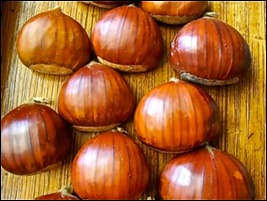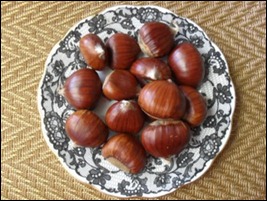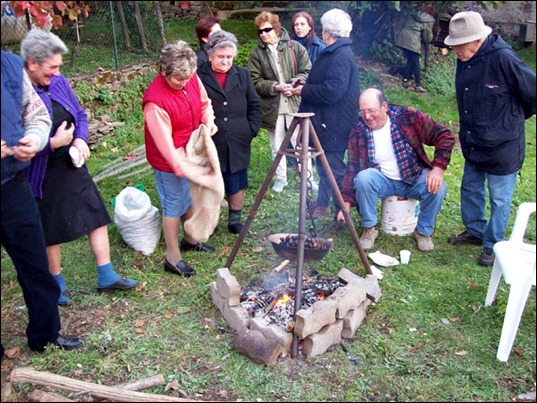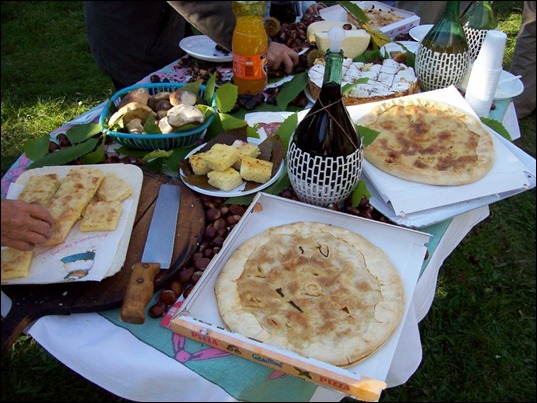NUTS! Posted by Geoff on May 24, 2013 in Culture
Today, our guest blogger Ambra Sancin writes abut idiomatic Italian expressions that use the word nuts. In case you missed Ambra’s previous blog ‘The Language of Coffee’, here’s a quick bio:
Ambra is a Sydney-based arts project manager in the cultural/not-for-profit sector and specialise in communications, marketing and producing public programs for festivals and government agencies. Born in Trieste, Italy, but whisked away to Australia as a baby, she has a special interest in working with diverse cultural and linguistic audiences, especially the Italian community. She professes to have catholic tastes and will foist her interests on you in her blog ‘The Good, the Bad and the Italian’: films, food, felines, design, musical theatre and all things Italian.
Sopra: Castagne
Researching English and Italian idiomatic expressions about food for a recent blog post, I was surprised to find so many referred to nuts.
There’s in a nutshell; you’re a hard nut to crack; it drives me nuts; I’m a history nut; I’m nuts about you; can’t do something for nuts and my personal favourite: even a blind squirrel finds a nut once in a while. In Italy, they’re more specific about the types of nuts they throw around in their written and spoken words.
Pignolo (literal translation ‘pine nut’) is used to describe a pedantic or fussy person. It’s also a ‘fussy’ red grape grown predominantly in the Friuli-Venezia Giulia region of northeast Italy (and so named because it produces low and uneven yields).
Castagna (literal translation ‘chestnut’) is by far the most versatile and interesting. The expression togliere le castagne dal fuoco (literally ‘to take the chestnuts out of the fire’) means ‘saving or solving one’s problem’. How wonderful then that the equivalent expression in English ‘to save somebody’s bacon’ also contains food. Then there’s cogliere in castagna (literally ‘to pick in chestnut’) – or ‘to catch someone red-handed’.
The feminine word castagna (the fruit of the chestnut tree) changes to the masculine castagno (chestnut tree): legno di castagno (chestnut wood) is very commonly used to make doors, window frames and furniture. At the beginning of the autumn the castagnatura (Italy’s September chestnut harvest) takes place, often followed by una castagnata (a chestnut festival where a wide variety of chestnut based products are eaten). The word castagna is also fashioned to create the word for the typical rustic Tuscan pancake ‘Castagnaccio’ (made with chestnut flour), although the pejorative suffix ‘accio’ makes it sound quite menacing!
Roasting chestnuts at a castagnata. Casalina in Valdatena, Lunigiana
Some of the traditional local home made dishes on offer, including, of course, caldarroste (roasted chestnuts)
To say someone ‘ha i capelli color castano/castagno’ gives them reddish brown hair (strangely, the ‘g’ can be dropped). And the brown colour marrone is identical to the word for the larger chestnuts which are often glazed to become the sweet marron glaçés.
I haven’t been able to ascertain the etymology of caldarroste, the Italian word for roasted chestnuts. It’s such a lovely word and conjures up the sights and smells of hot chestnuts sold in paper cones by vendors on city streets in winter.
To herald the start of the chestnut season here in Australia, I’m eating them like there’s no tomorrow. I’m also enjoying using the expression that old chestnut – or even better – that hoary old chestnut. It’s a shame there’s no Italian equivalent as it would be as beautifully floury as the nuts themselves!

Build vocabulary, practice pronunciation, and more with Transparent Language Online. Available anytime, anywhere, on any device.








Comments:
jill:
The last three posts on fruits, veggies and nuts have been especially wonderful. Thank you.
Geoff:
@jill Salve Jill. non c’è di che!
Geoff